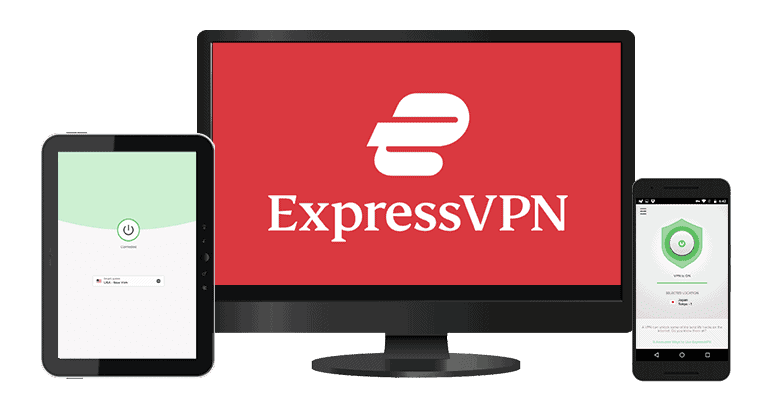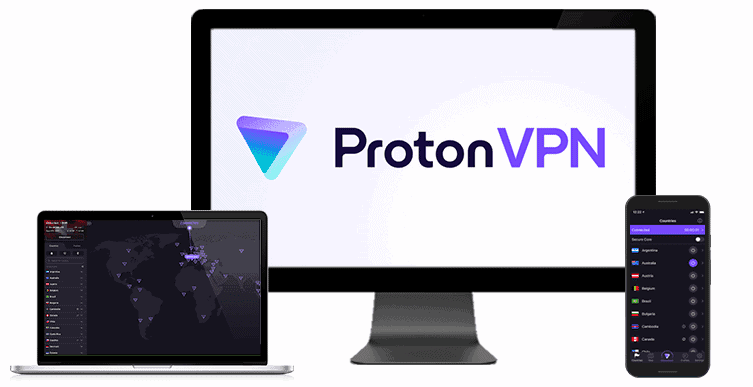
Updated on: January 8, 2025
Short on time? Here’s the best VPN for school in 2025:
- 🥇 ExpressVPN : It uses military-grade encryption to hide your online activity so your school can’t see what you’re doing online, obfuscates your traffic to circumvent advanced filters that block VPNs, can access all top streaming sites, and has a large server network (105 countries). It maintains super-fast speeds and backs all purchases with a 30-day money-back guarantee.
A VPN is the best way to get around restrictions on school networks. VPNs encrypt your traffic, making it unreadable to the network administrator and allowing you to get around firewalls they use to block access to certain websites (like social media and gaming sites). The network administrator also won’t be able to see what you’re doing online, so you can privately and securely browse the web at school.
Top VPNs circumvent VPN blocks, too, by using obfuscation. This is an advanced feature that disguises your VPN traffic as normal traffic, which lets you evade technology that some schools use to detect and block VPN traffic.
I tested 30+ VPNs and found the best VPNs to use on a school network. They all use the strongest encryption standard to secure your online activities and offer obfuscation. My favorite is ExpressVPN because it has excellent security and privacy features, can access 100+ streaming services, and is the fastest VPN on the market. Editors' Note: ExpressVPN and this site are in the same ownership group.
Quick Summary of the Best VPNs for School
Editors' Note: Intego, Private Internet Access, CyberGhost and ExpressVPN are owned by Kape Technologies, our parent company
🥇 1. ExpressVPN — Best Overall VPN for Schools in 2025
ExpressVPN is my top recommended VPN to use at school. It gets around all sorts of network restrictions that schools commonly use on their networks, and it works well with popular social network sites, 100+ streaming services, and online gaming platforms — this is why we rank it as the best overall VPN in 2025.
ExpressVPN offers obfuscation (a feature that masks your VPN traffic as regular traffic) on all servers and protocols — it helps you evade VPN blocks. Plus, you don’t even have to lift a finger to make it work, as the provider automatically enables obfuscation when it detects a network’s attempt to block your connection.
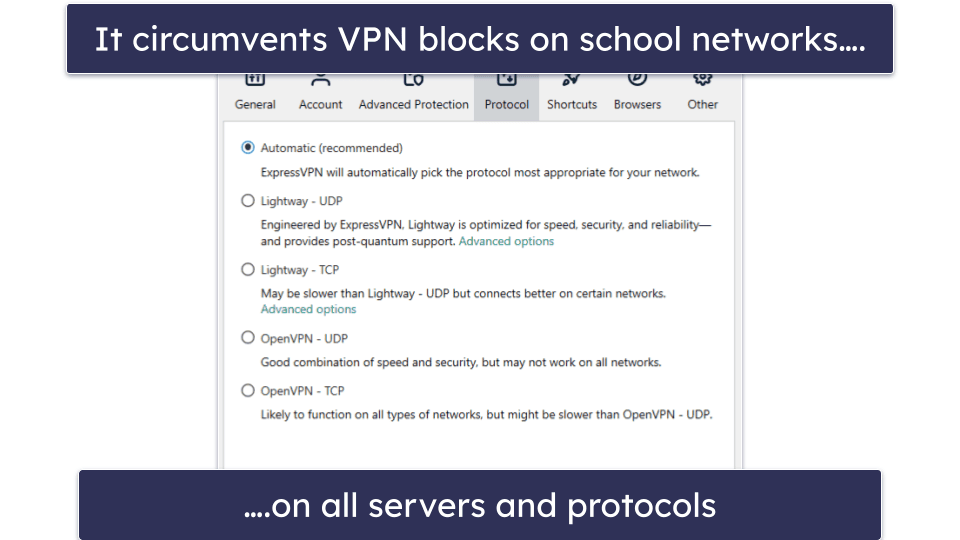
ExpressVPN has blazing-fast speeds. In my tests, I hardly even noticed I was using a VPN — websites and videos loaded right away on nearby and distant servers. This is why it’s the fastest VPN in 2025. Another great feature is it has servers in 105 countries, so almost any user can find a nearby server to get the best speeds.
ExpressVPN has intuitive apps for all devices, including Android, iOS, Windows, and macOS. All servers are separated into regions, so you don’t have to scroll through the entire list of servers to find the one you’re looking for, and you can mark servers as favorites, so they’re easy to spot.
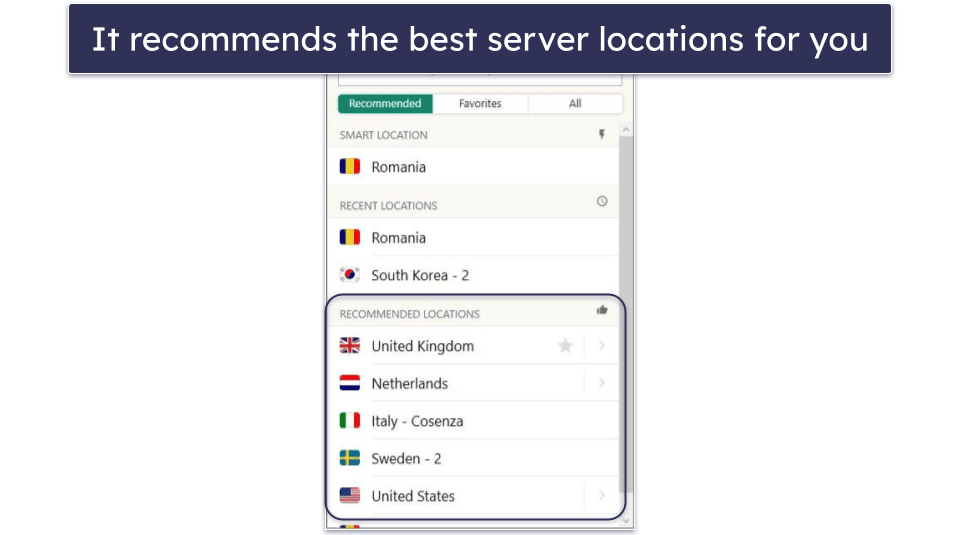
ExpressVPN has strong security features to keep your online connections safe at school. It uses RAM-only servers, which wipe all data upon reboot and a strict no-logs policy, meaning it doesn’t store logs of your online data — this prevents a third party from obtaining information about the websites you visit or files you download. It has built-in protection against DNS, WebRTC, and IPv6 leaks to prevent your IP address from leaking to the sites you visit while on the school network.
It’s our top choice for streaming, gaming, and torrenting. It can access 100+ streaming services, including Netflix, Amazon Prime, and Max, and gamers will like how it comes with anti-DDoS protection, which stops opponents from forcing you offline and is one of the only VPNs out there that has cloud gaming support. Plus, ExpressVPN supports torrenting on all servers and works with all popular P2P clients.
ExpressVPN offers plans starting at $4.99 / month, all of which are backed by a 30-day money-back guarantee, so you can try it completely risk-free.
Bottom Line:
ExpressVPN is the #1 VPN to use in school. It bypasses common firewalls that schools use, offers obfuscation on all servers and protocols to hide your VPN connection, and comes with advanced security features. It’s blazing-fast, has easy-to-use apps for all major operating systems, and is excellent for streaming, gaming, and torrenting. ExpressVPN covers all purchases with a 30-day money-back guarantee.
Read the full ExpressVPN review
🥈 2. Private Internet Access — High-Security VPN for School With a Great Browser Extension
Private Internet Access (PIA) has advanced features to secure your online activities in school. In addition to RAM-only servers, an audited no-logs policy, and full leak protection, I’m a big fan of its Advanced Kill Switch, which disables your internet access if you aren’t connected to the VPN — this way, you won’t accidentally visit social media sites and gaming platforms unprotected.
In case you can’t install PIA on your school computer, it has a great browser extension for Firefox, Opera, and Chrome. The extension has a similar design to the PIA app, and it gives you access to all of PIA’s servers. It’s got a long list of privacy-focused features, too, like blocking location access, as well as the ability to turn off Safe Browsing.
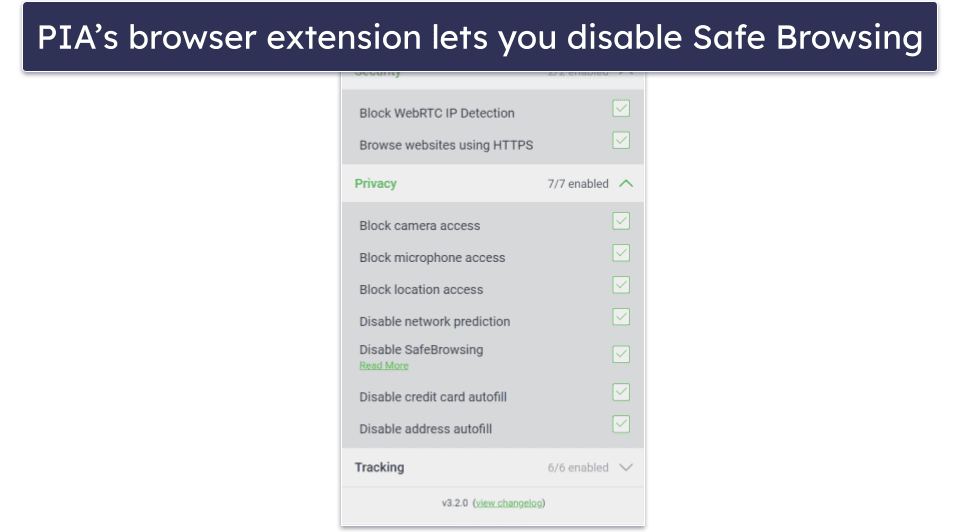
PIA provides obfuscation, too, via the Shadowsocks protocol, which works great with common filters that schools use on their networks to block VPN traffic. You get Shadowsocks servers in 5+ countries with PIA, including the US, the UK, and Canada. While Shadowsocks is a good obfuscation tool, I prefer ExpressVPN’s obfuscation over PIA’s because it obfuscates your traffic on all servers and protocols.
When it comes to streaming and gaming, PIA is a great option. It works with lots of popular sites like Amazon Prime Video and Disney+, and it has anti-DDoS protection on all servers.
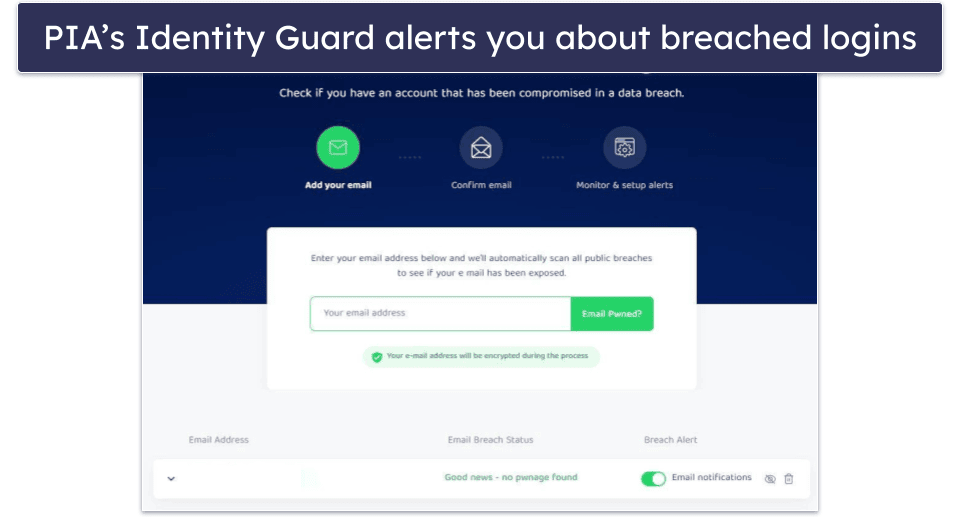
PIA’s got great speeds for all internet activities. In my tests, websites and HD videos loaded almost instantly, and I didn’t notice any lag while gaming. Still, ExpressVPN was faster in my tests.
Private Internet Access’s plans are super affordable, starting at $2.03 / month. It has a 30-day money-back guarantee on all plans.
Bottom Line:
Private Internet Access is great for anonymizing your online activities on a school network. It has an Advanced Kill Switch feature to protect you from accidentally going online unprotected and a privacy-focused browser extension in case you can’t download a VPN on your school computer. It’s great for gaming and streaming, and it can get around VPN blocks at school. It offers a 30-day money-back guarantee on all purchases.
Read the full Private Internet Access review
Editors' Note: Private Internet Access and this site are in the same ownership group.
🥉 3. NordVPN — Fast VPN for Gaming at School
NordVPN is great for gaming at school thanks to its very fast speeds. In my tests, I never experienced any lag in my online games on both nearby and distant servers. My favorite NordVPN feature for gaming is Meshnet, which lets you create a private network and link up to 60 devices to an encrypted connection.
For example, you can use it to connect your school PC to your computer at home and reroute all of your traffic through it. This is especially useful if you can’t download a VPN app on your school computer — just use your home PC as a VPN server. Since NordVPN also encrypts all traffic sent over Meshnet, the school’s admins can’t monitor your traffic.
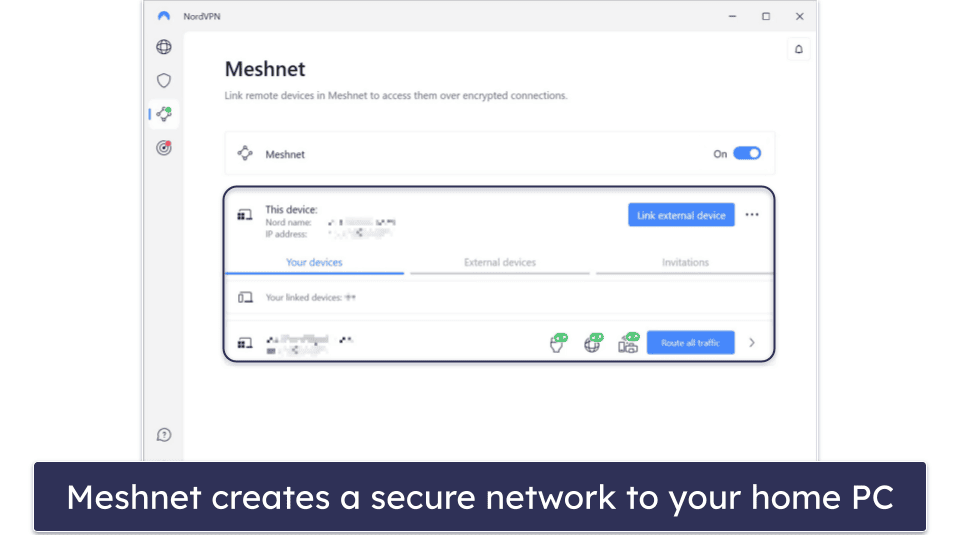
NordVPN hides your VPN use at school with obfuscated servers in 15+ countries — it’s a pretty big server network but not as impressive as ExpressVPN, which offers obfuscation on servers in 105 countries. In addition, NordVPN includes advanced security features, too, including RAM-only servers, an audited no-logs policy, and full leak protection. Like Private Internet Access, it offers a Dark Web Monitor, which scans the dark web for data leaks and alerts you if it finds your gaming or streaming login credentials.
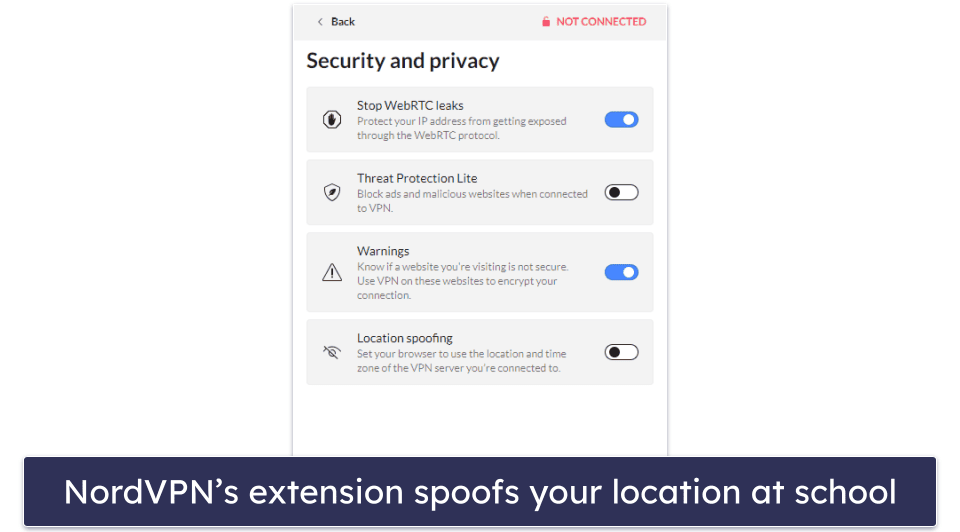
NordVPN offers user-friendly apps and browser extensions for Chrome, Firefox, and Edge. The extensions are great for some network filters thanks to its location spoofing, which masks your GPS location and time zone.
As for streaming, it works with 10+ popular streaming platforms, such as Netflix, Max, and Hulu.
NordVPN has plans starting at $3.39 / month, accompanied by a 30-day money-back guarantee.
Bottom Line:
NordVPN has excellent features for gaming at school, such as Meshnet, which lets you create a multiplayer LAN party with all your friends. It also scans the dark web for your game login credentials, and it has pretty strong security. NordVPN has a great browser extension for Chrome, Firefox, and Edge if you can’t install NordVPN on a school device.
4. Surfshark — Customizable VPN With Great Streaming Support
Surfshark is a great VPN for streaming on a school network. On top of working with 50+ popular streaming platforms, such as Netflix, Amazon Prime Video, Apple+, and Max, it gets around school filters to streaming movies and TV shows with its NoBorders feature, which is automatically enabled whenever it detects network restrictions — you can also manually enable it in the app. There’s also Camouflage Mode, Surfshark’s obfuscation feature, that helps with VPN blocks on school networks.
Its apps are very easy to navigate, and there are plenty of features that help you connect to a server with as few clicks as possible, so you don’t waste precious minutes of break time. It’s got convenient Fastest Location and Nearest Country options on the main window and lets you customize the Quick connect button to connect you to any server on its list. Surfshark’s browser extension for Chrome, Firefox, and Edge is similarly user-friendly.
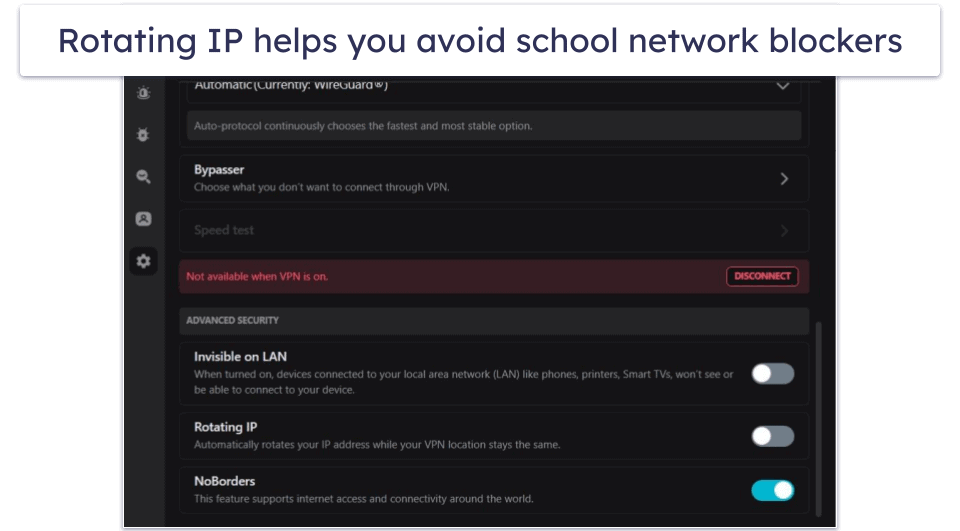
Surfshark secures your online activities on a school network with advanced security features, such as RAM-only servers, an audited no-logs policy, and DNS leak protection. For even better privacy, you can turn on Surfshark’s Rotating IP feature, which regularly refreshes your IP address without changing your VPN location. This makes it difficult for anyone to easily track you.
Surfshark has good speeds on nearby servers. In my tests, all websites and videos loaded instantly, and I didn’t experience any lag when gaming. My speeds slowed down when I connected to more distant servers, which is why I prefer ExpressVPN, as it provides super-fast speeds.
Surfshark has budget-friendly plans starting at $2.19 / month. All plans come with a 30-day money-back guarantee.
Bottom Line:
Surfshark is great for streaming on a school network. It works with 50+ streaming sites, has decent speeds, and its apps are very easy to use — even its browser extensions are simple to navigate. Surfshark has a unique NoBorders feature for getting around school networks and it offers obfuscation. It backs all plans with a 30-day money-back guarantee.
Read the full Surfshark review
5. PrivateVPN — Beginner-Friendly VPN for School With Affordable Plans
PrivateVPN’s super simple apps are great for circumventing restrictions at school, especially if you’re a VPN beginner who isn’t interested in tweaking any settings to secure your connections — however, there are setting that are customizable for more advanced users. PrivateVPN automatically enables all features that protect your traffic, so all you’ll have to do is connect to a server and let the app run in the background.
PrivateVPN uses Stealth VPN to obfuscate your traffic and avoid any VPN blocks on your school networks. It also has built-in DNS and IPv6 leak protection and a no-logs policy — though it hasn’t been audited and verified by a third party, like ExpressVPN.
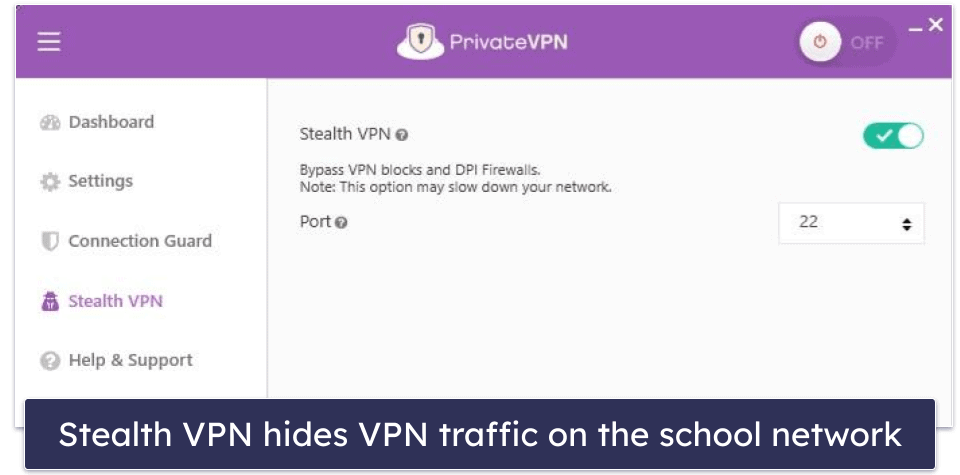
PrivateVPN has good streaming support. It accesses 20+ streaming services, including Netflix, Amazon Prime Video, and Disney+. The VPN protects you against DDoS attacks on all its servers, and I had low ping when playing multiple games.
Speaking of speeds, PrivateVPN is fast for all online activities. In my tests, social media websites loaded instantly and HD videos took 1–2 seconds to load. However, one of my biggest complaints with PrivateVPN is it doesn’t support browser extensions, unlike the other top VPNs on this list.
PrivateVPN has cheap plans that start at $2.00 / month. Each plan is backed by a 30-day money-back guarantee.
Bottom Line:
PrivateVPN is a very simple, no-frills VPN to use at school, making it an excellent pick for VPN beginners. Its apps are simple to use, it comes with an obfuscation feature that avoids VPN blocks on school networks, it’s secure, and it’s fast. PrivateVPN covers all plans with a 30-day money-back guarantee.
Read the full PrivateVPN review
6. Proton VPN — Privacy-Friendly VPN With Good Speeds
Proton VPN offers excellent privacy for going online on a school network. I like how its Stealth feature easily obfuscates your VPN traffic with 1 click. On top of that, you also get full leak protection, its no-logs policy has passed an independent audit, and its full disk encryption tool scrambles all data on its servers — so, even if they’re compromised, no one can see any information about you going online at school. Plus, all of its apps are open-source, which means the code is available for anyone to inspect for flaws — and they’ve also been audited and confirmed.
It can access popular streaming sites like Netflix and Disney+, and it has very good speeds for all online activities at school. I especially like its VPN Accelerator feature, which improves your speeds when you connect to distant servers — I noticed a significant uptick in my speeds with the feature enabled than without it. In addition, you can use it with Stealth, Proton VPN’s obfuscation feature, to counter the slowdown that obfuscation causes.
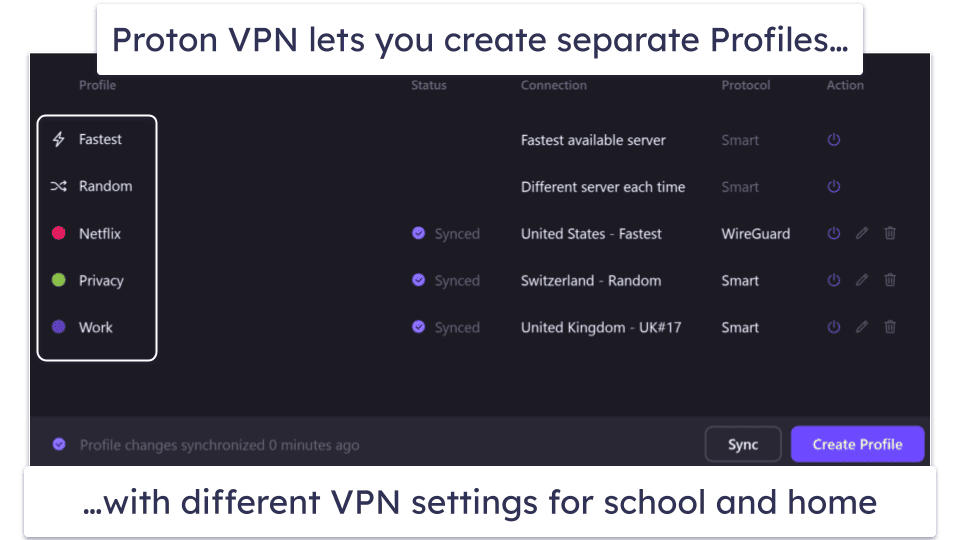
Proton VPN’s apps are pretty easy to use. I especially like the Profiles feature, which lets you create a custom VPN connection. You can create a profile to use at school which enables its obfuscation feature, enables the Accelerator feature, and connects you to your preferred server location — all in 1 click.
Proton VPN offers competitive plans ($3.59 / month), and all of them are supported by a prorated 30-day money-back guarantee. It also offers a pretty good free plan for browsing at school — it allows you to access servers in 5 countries, is ad-free, has fast speeds, and comes with the Stealth feature but you only get 1 connection, it doesn’t support streaming, and has other features behind the paywall.
Bottom Line:
Proton VPN is great for protecting your privacy on a school network. It’s got advanced security features, a unique speed-boosting feature, and obfuscation. It also lets you create profiles in the app to create custom VPN connections and enable them with just 1 click when you’re on the school network. All of its plans come with a 30-day money-back guarantee.
Read the full Proton VPN review
7. TunnelBear — Simple VPN for School That’s Fun to Use
TunnelBear is a simple but effective VPN that unblocks websites at school. Its obfuscation feature, called GhostBear, works really well on restrictive networks, and it’s very easy to enable in the app’s settings. All of TunnelBear’s apps are super easy to navigate, so you won’t feel overwhelmed if you’re new to VPNs — plus, you’ll love all of the cute bears on the apps!
TunnelBear has a browser extension, too, if you don’t want to install the VPN app. It’s available for Firefox and Chrome, and it lets you connect to any of TunnelBear’s servers. Plus, it works with popular sites, such as Netflix and Max.
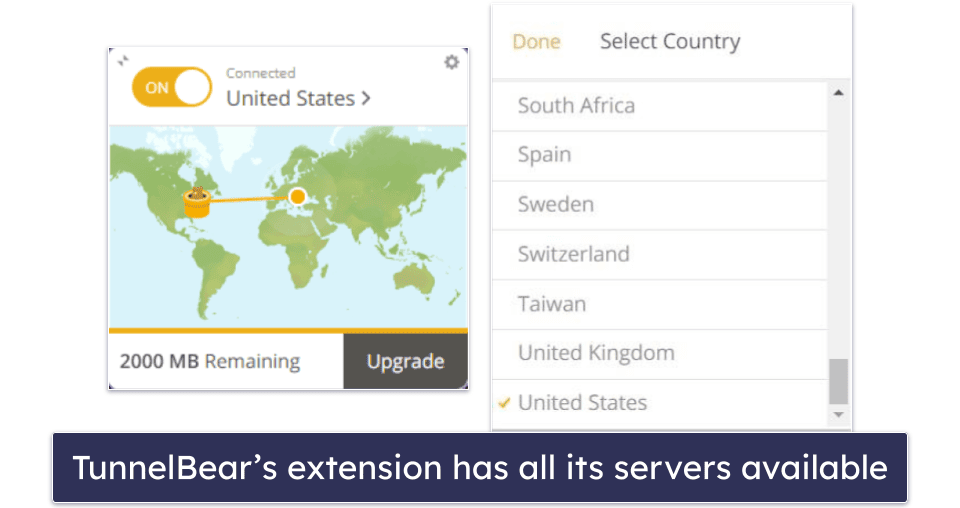
TunnelBear’s speeds are pretty good. I didn’t encounter any significant slowdowns and all social media websites and gaming platforms loaded immediately on nearby servers. However, my speeds slowed down when I connected to a distant server.
TunnelBear’s premium plans start at $3.33 / month, but it doesn’t offer a money-back guarantee. Instead, there’s a free plan that limits you to 2 GB of traffic monthly so you can test out all of its features.
Bottom Line:
TunnelBear is a simple VPN that unblocks social media websites and gaming platforms on school networks, and gets around VPN blocks thanks to its GhostBear obfuscation feature. It has good speeds on its servers and a simple browser extension for Chrome and Firefox. It even has a free plan that lets you test out all of the VPN’s features, with a 2 GB data limit.
Read the full TunnelBear review
Quick Comparison Table
Editors' Note: Intego, Private Internet Access, CyberGhost and ExpressVPN are owned by Kape Technologies, our parent company
Testing Methodology: Comparison & Ranking Criteria
I followed our proven SafetyDetectives testing methodology to ensure that only the best of the best VPNs make it onto the list. I extensively tested 30+ VPNs in realistic scenarios, including their speed and security settings, as well as their compatibility with social media sites and gaming platforms, and compared my results. Here’s a breakdown of my criteria and how I chose and ranked the VPNs here:
- I made sure each VPN works against commonly used school filters and blocks. All the VPNs on this list work well on restrictive networks and have an obfuscation feature that can bypass VPN blocks on school networks, too.
- I looked for a VPN with strong security and privacy features. I only recommend VPNs with industry-standard features, such as 256-bit AES encryption (used by militaries and governments), a kill switch (turns off your internet connection if the VPN connection drops), and a strict no-logs policy (won’t monitor or record your activities). I also tested the VPNs for IP leaks.
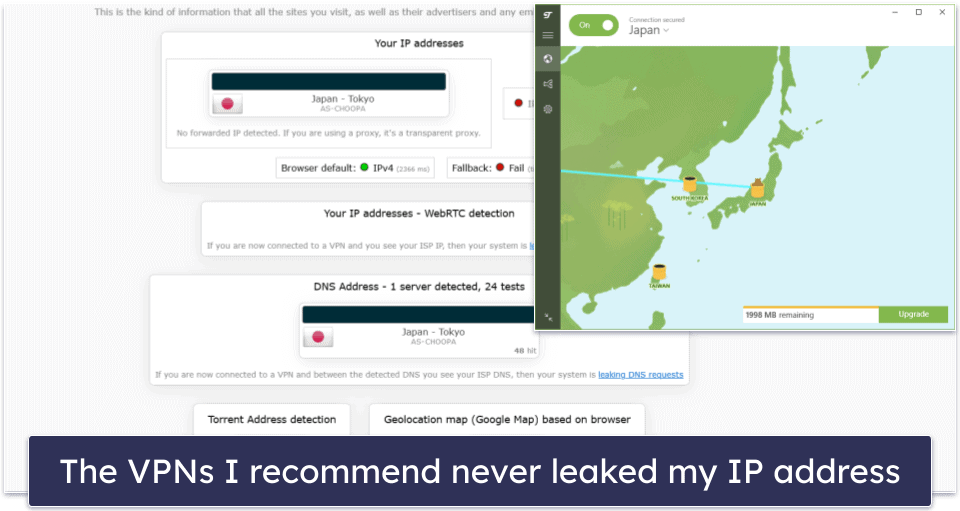
- I checked the VPN apps for ease of use. The VPNs I recommend here don’t require any advanced technical knowledge to use them. They make it super simple to connect to a server and many automatically detect and enable features that get around school filters.
- I tested each VPN’s speeds. All VPNs slow down your connection because of the encryption process that maintains your privacy. The VPNs on my list all have excellent speeds for all online activities — but ExpressVPN was the fastest among them in my tests.

- I tested the VPNs’ streaming and gaming support. All the VPNs on this list support streaming and work with popular streaming services like Netflix and Amazon Prime. Plus, they’re compatible with top gaming platforms and ensure minimal lag.
- I examined every VPN’s overall value. The VPNs listed here offer plenty of extra features, back their plans with a money-back guarantee, or offer a free plan, allowing you to try them without risk.
Top Brands That Didn’t Make the Cut
- CyberGhost VPN. CyberGhost VPN is a highly-secure VPN with excellent streaming and gaming support and user-friendly apps. However, it lacks an obfuscation feature, so it can’t bypass advanced filters that block VPNs on school networks.
- IPVanish. IPVanish is fast and is pretty decent for streaming, but it lacks obfuscation and isn’t as fast as the VPNs that made it onto my list here.
- VyprVPN. VyprVPN has an obfuscation feature and good security, but its plans are more expensive compared to the VPNs I recommend.
Frequently Asked Questions
Why do I need a VPN for school?
With a VPN, the school’s network administrators can’t see what you’re doing online and won’t block access to websites you want to visit. VPNs scramble your traffic by using encryption, making it impossible for anyone to examine your traffic to see what websites you’re visiting and whether you’re streaming or gaming. Top VPNs, like the ones I recommend, also offer obfuscation, which bypasses restrictions that block VPN traffic on school networks.
My favorite VPN to use on a school network is ExpressVPN, because it has super strong encryption, obfuscation on all servers, and lightning-fast speeds that are great for streaming, gaming, or just scrolling through social media.
Can the school’s network detect that I’m using a VPN?
Some schools use advanced network filters that detect and block VPN traffic. This is why all the VPNs I recommend on this list have some form of obfuscation available. Obfuscation masks your VPN traffic as normal traffic, so the network can’t detect it and block you.
What do I do if I can’t install a VPN on my school computer?
You can try adding a VPN extension to your browser, which will encrypt your data and let you connect to a VPN server. Most of the VPNs on this list have browser extensions for Chrome and Firefox, as well as some other browsers.
If the school network doesn’t allow you to download a VPN app, and you’re free to take your computer home, you can install a quality VPN like ExpressVPN on your home network. If that’s not an option, you can install the VPN app on your own device, like your phone, to get around network filters.
Can I use the same VPN on my school computer and my personal devices?
Yes, you can. All the VPNs on this list let you connect multiple devices under a single subscription. They all have apps for major operating systems, including Android, iOS, Windows, macOS, and Linux, so you can cover all your devices.
